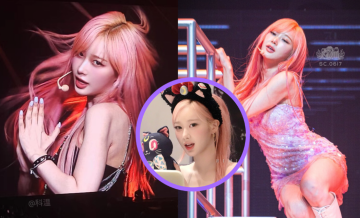More Devil’s Music, the Sinister Sounds of Etu Malku [VIDEO]
Music has its charms and its mysteries, but it also holds keys that open doors to understanding hidden meanings. Many musicians believe in the mystical qualities of music. Some musicians have made some very serious studies of the spiritual effects of music, from the incessant and sexually pounding Afro-Caribbean rhythms of Voodoo and Santeria to the enlightened transcendence of the classical spiritual or the emotional spiritualism of gospel music. The Who's Pete Townshend wrote Lifehouse, a rock opera that was supposed to follow the Tommy album but which wound up being released as the incomplete, though classic, Who's Next under the influence of the music of the spheres, a concept he picked up from the book The Mysticism of Sound and Music: The Sufi Teaching of Hazrat Inayat Khan. George Harrison was proud to find his audience subliminally praying a Hindu chant by the end of the single My Sweet Lord. Of course, there are many who still believe that rock and roll is the devil's music.
Etu Malku is Magus III° of the Ordo Luciferi and is a former member of the Temple of Set. He is a respected authority on Left Hand Path (black magick) practices, saying "You name it, I've studied it. Lately I am focusing on Chaos Magick and Luciferian Philosophy." He is also a virtuoso guitarist and compelling composer who was chosen by music at the age of 18 when he opted to play lead guitar in a Jersey shore band instead of going to summer school to make up for a class and let him graduate high school. Malku's earliest influences were guitarists Jimi Hendrix, Jimmy Page, and Tommi Iommi, the dark guitarist of Black Sabbath, along with the prog-rock stylings of Jethro Tull, King Crimson and Robert Fripp, with whom Malku studied at the Claymont Society for Continuous Education in West Virginia in the 1985. "We were Crafty Guitarists. Robert called this guitar discipline Guitar Craft," Malku remembers. Malku led or played in quite a few bands and created layered soundscapes behind the spoken word artist Frank Messina. Among his composing credits is the first theme for La Commedia del Sangue: New York City's Vampyr Theatre. He used to moderate the Vampire Forum of Darkness but "unfortunately that forum is run amok with spammers these days." Although he does not define himself as a vampire, Malku says he adheres to the philosophy of Predatory Spiritualism.
Malku has been studying the spiritual effects of music and the dark arts in general for the past eight years. "It wasn't until a bit later in my musical life when I became interested in adding the K to everything. Like MusicK or MagicK." Malku combines ancient Persian, Sumerian, Egyptian and Hindu music with industrial sounds. He modified some guitars into fretless instruments in order to play the quartal tones of Middle Eastern and Indian instruments. He uses irregular time signatures because "Most of the world plays music in odd time signatures and because of my studies in ancient musics I incorporate all kinds of meter and temperaments." He also lists Bartok, Bach, Grieg, Beethoven and Wagner as his influences when he is composing his aural magickal workings. Malku uses ritual, sigilism, neuro-programming and ancient shamanic techniques in his composition. He practices hekam the ancient kemetic art of high vibrational magick. "I have created musiq from rituals and rituals from musiq. Sometimes the title alone will shed Light on what the composition is about or to be used for." Malku uses backwards masking techniques "along with creating musiqal sigils, binaural beats and brain entrainment, creating musiq as a ritual, staota, subliminal deceptive practices, and other more obscure occult devices which I may divulge in the book I've been trying to write."
Malku is a Luciferian, adhering to a Left Hand Path philosophy that combines magick, ritual, and science to achieve combine to achieve Gnosis, a balance of light and dark. Malku's interest in Luciferianism and left hand path magick began very early. He explains "As a child my family moved to Dumont, N.J. it was then my path changed drastically. I was crawling around under our front porch and found way back in the wrap around portion a tiny night table and the Satanic Bible." Malku was introduced to the "follow your bliss" teachings of Joseph Campbell by a musician friend in the early 90s. "I recently watched all of them again on Netflix, Campbell was right on with his ideas of the Hero and his descent into an Underworld, defeating demons and monsters, gaining some magickal weapon, returning to the mundane world and shedding this Promethean Light. You know Prometheus is one of the many Lucifers throughout history? Campbell was describing what occultists refer to as initiation."
Malku doesn't differentiate belief systems as Christian, Sufi or Satanic. For him, there are two Paths, a Right Hand and a Left Hand Path. He explains, "The majority of belief systems are Right Hand Path, in that they seek to atone with the objective universe, to become one with nature, the physical realm that is metaphored as something Divine/Godlike. Those of us on a Left Hand Path seek to separate from this realm in order to know our true self, our god-self, commonly referred to as apotheosis and/or autotheism." Malku sums up the difference between the two paths as "Thy Will Be Done = RHP and My Will Be Done = LHP."
Malku isn't alone in exploring the dark side of mysticism through music. He says "Within the Temple of Set there is a group of musicians who further their spiritual evolution through sound. Many popular artists like Bowie, Page, Manson, and Diamond openly admit to non-RHP influences, Danny Carey the drummer of Tool is a Thelemist I understand. There exists a plethora of musical artists who approach their art from a LHP angle, Thomas Karlsson of Therion is the founder of The Dragon Rouge, and author musician Michael W. Ford is the founder of several Luciferian Adversarial groups." But Malku doesn't cite musical examples, "I can't speak for another artist's intention musically."
Before his diabolic revival, Etu Malku immersed himself in the blues, especially Robert Johnson, the legendary blues guitarist who, according to legend, went to the crossroads to sell his soul to the devil in exchange for magick fingers (or who didn't want to get lynched for being alone on a road in the middle of nowhere and the night, as the lyrics imply). I asked Malku if it was possible to sell your soul to catch that perfect sound. "Now that would depend on your definition of soul and selling it," he answered. After years of study of the dark arts and music, I was curious to know if it was possible to conjure Lucifer through a song. "Yes," he said, "I'll leave it at that."
















